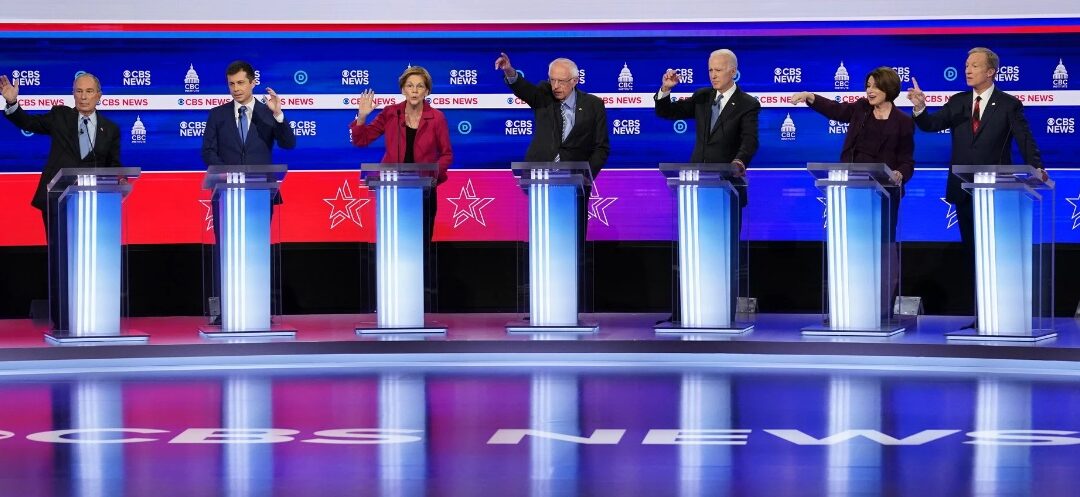The Democratic presidential candidates delivered a barrage of criticism against their party’s emerging front-runner, Senator Bernie Sanders, at a debate tonight, casting him as a divisive figure with unrealistic ideas, even as they continued to batter Michael Bloomberg for his extreme wealth, his record on policing and his behavior toward women.
In a messy South Carolina forum characterized by frequent interruptions, angry cross talk and theatrical hand-waving, Sanders faced the most serious test so far of his bid to lead the Democratic Party into the general election.
His rivals charged at him on multiple fronts, including his history of opposing certain forms of gun control, his plans for single-payer health care and, most of all, his odds of beating President Trump.
But the mood of combat enveloped candidates besides Sanders, with Senator Elizabeth Warren of Massachusetts again castigating Bloomberg, the former mayor of New York City, in vivid terms about his past support for Republicans and allegations that he had pressured an employee to have an abortion, a charge Bloomberg vehemently denied.
And in an explosive manifestation of a bitter rivalry for South Carolina’s voters, former Vice President Joe Biden rebuked Tom Steyer, a billionaire spending heavily in the state, for having previously invested in private prison companies.
It was Sanders, however, who had the roughest night: Former Mayor Pete Buttigieg of South Bend, Ind., warned that nominating Sanders would not only cost Democrats their chance to capture the White House, but also jeopardize their majority in the House and their chance of taking the Senate.
Pointing to the congressional Democrats elected in 2018, Buttigieg told Sanders, “They are running away from your platform as fast as they possibly can.”
Bloomberg joined in, saying of Sanders: “Can anybody in this room imagine moderate Republicans going over and voting for him?”
Biden, fighting for survival in the state on which he has staked his candidacy, delivered perhaps the most searing critique of Sanders, invoking the 2015 massacre at Emanuel African Methodist Episcopal Church here in Charleston to confront Sanders for his mixed record on guns.
“Nine people shot dead by a white supremacist,” Biden said, then rebuked Sanders for his past opposition to waiting periods for gun purchasers: “I’m not saying he’s responsible for the nine deaths, but that man would not have been able to get that weapon if the waiting period had been what I suggest.”
Addressing concerns about his electability, Sanders, a Vermont socialist, claimed that in the overwhelming majority of polls he came out ahead of Trump.
He responded forcefully to an attack by Bloomberg claiming that the Russian government was seeking to buoy Sanders’s campaign, citing Bloomberg’s past laudatory remarks about President Xi Jinping of China.
On display, too, was Warren’s dual challenge as she fights for national momentum ahead of next week’s Super Tuesday contests: On the one hand, she is plainly eager to keep up a battle against Bloomberg that has delighted her supporters and reinvigorated her candidacy.
At the same time, she must contend, perhaps more urgently, with the fast and formidable rise of Sanders on the left — a force she tried to counter by casting herself as the more accomplished progressive.
She pointed to their shared history of battling Wall Street: “In 2008, we both got our chance,” Warren said, “but I dug in, I fought the big banks, I built the coalitions and I won.”
Soon, though, the debate devolved into something of a rhetorical melee, with the seven candidates talking, and nearly shouting, over another.
Eventually Sanders was able to speak and cited studies indicating that “Medicare for all will save money,” but before long he was facing more incoming from Bloomberg, who called the long-term consequences of a Sanders nomination and Trump re-election a “catastrophe.”
When Sanders was able to reply, he castigated Bloomberg for having the support of only billionaires.
Similarly, when Sanders was asked about a vote he cast to protect gun manufacturers, the senator was met with boos when he initially responded that “Joe has voted for terrible trade agreements.”
In a sign that Steyer was making inroads with South Carolina’s black voters, Biden also took on the billionaire and first-time candidate, noting that Steyer had invested in private prisons that “hogtied young men.”
Stung by the attack, Steyer said he had sold his stock in private prisons and then sought to highlight Biden’s support for the hard-line 1990s crime bill.
But Biden interrupted him and tagged him with a new nickname for changing his mind on private prisons: “Tommy Come Lately.”
This debate, the 10th of the primary season, was the first time that the Democratic candidates gathered with a measure of clarity about who was in command of the race.
Coming off his landslide win in Nevada, and successes in Iowa and New Hampshire, Sanders is the clear front-runner for the nomination.
What is less clear is who may emerge as his most formidable opponent.

Joe Biden won that hands down